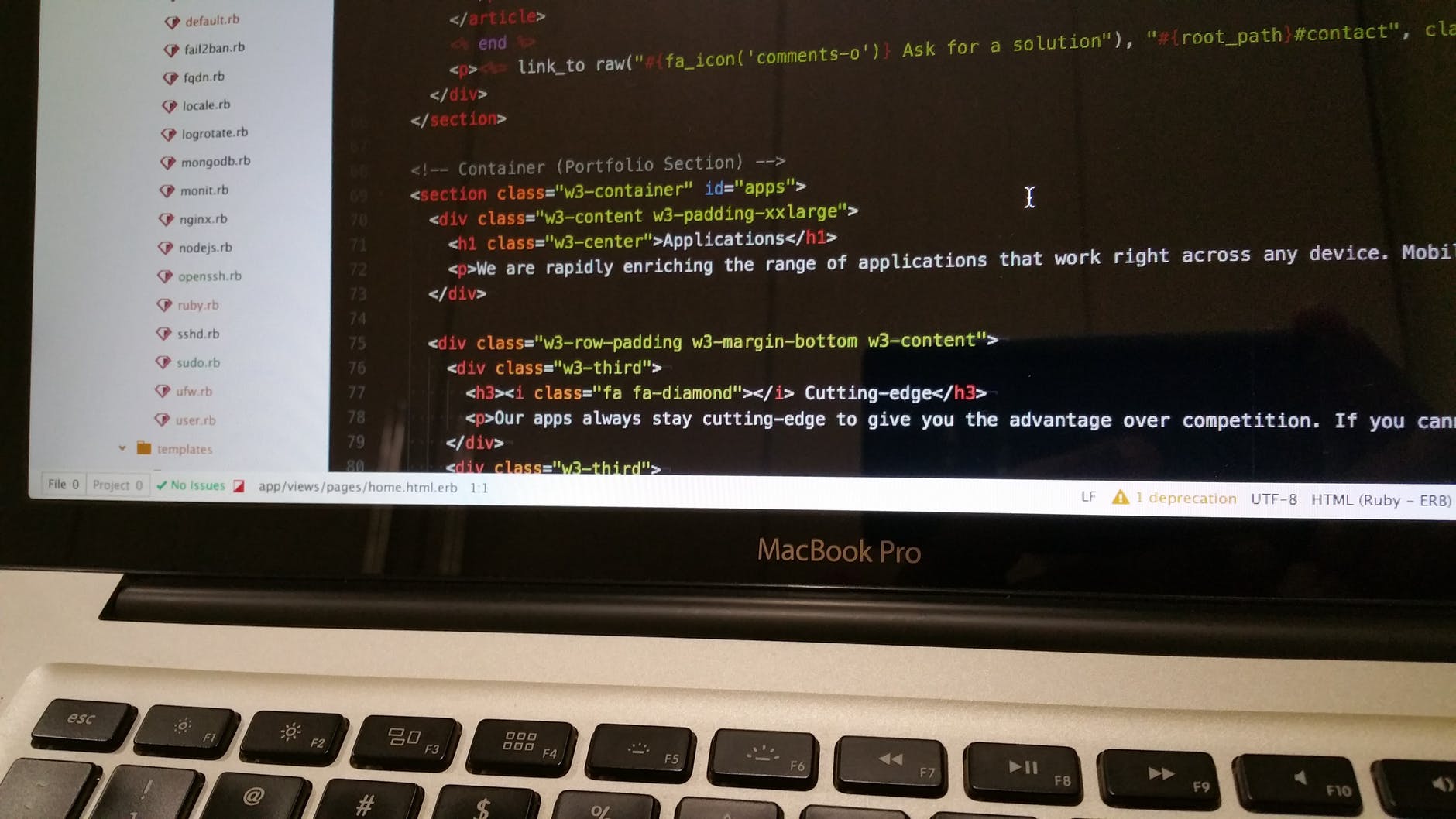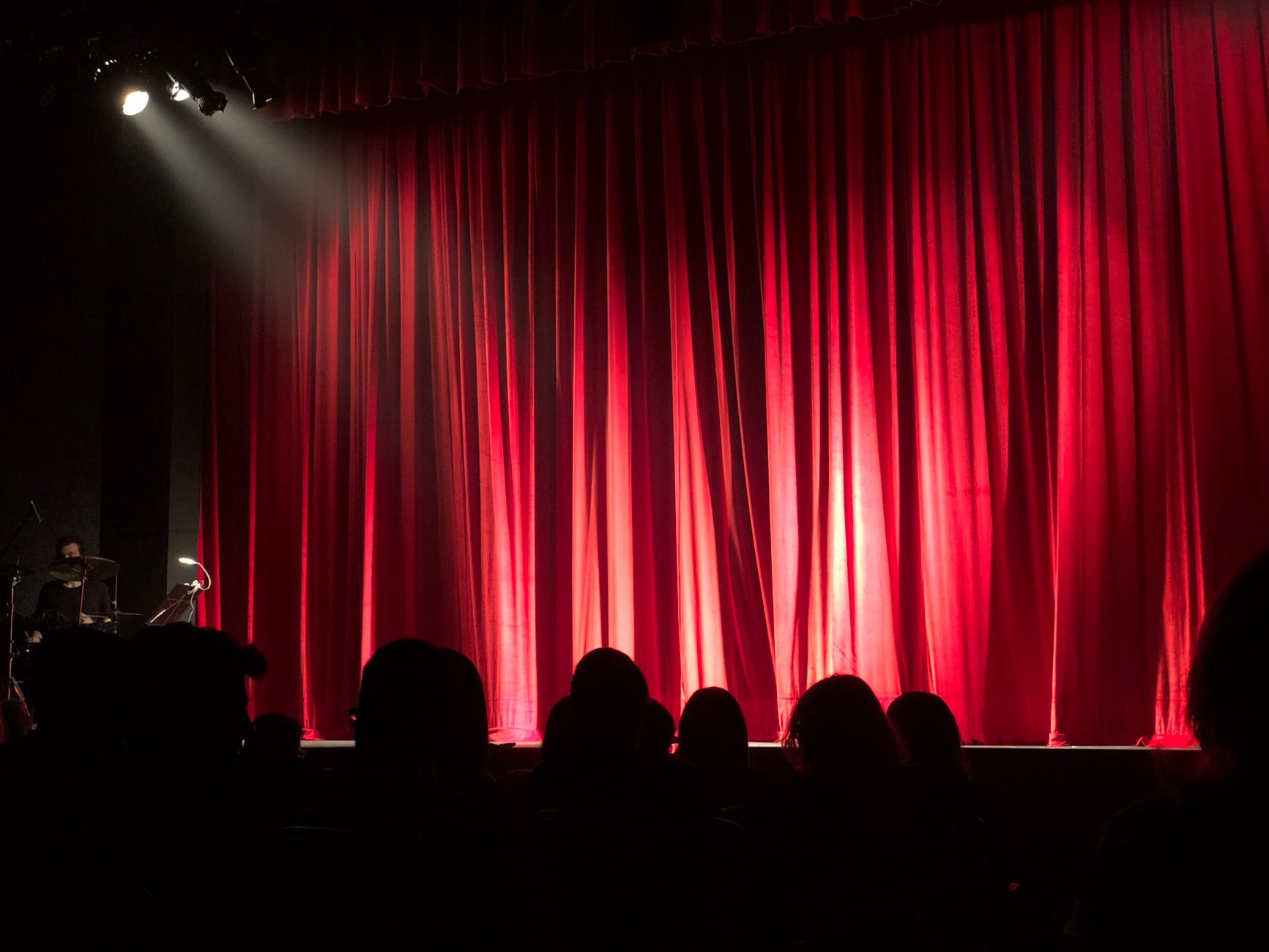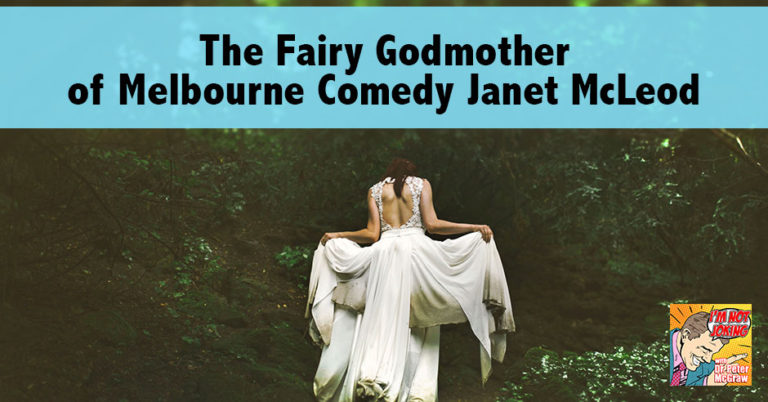Janet McLeod (The Fairy Godmother of Melbourne Comedy) has been working in the comedy industry for over 20 years as a writer/performer/behind-the-scenes-whiz-kid. She regularly hosts live trivia nights across Melbourne, is the producer of the longest running weekly standup comedy room in Melbourne (Local Laughs on Monday nights in St Kilda) and is co-host of Cinema Fiasco (the show where she and her co-host Geoff Wallis screen B-grade movies in cinemas and provide a live running commentary as they play. Yes, it is as much fun as it sounds).
Listen to Episode #11 here
The Fairy Godmother of Melbourne Comedy Janet McLeod
Our guest is The Fairy Godmother of Melbourne Comedy, Janet McLeod. That’s not an exaggeration. She brings people together and she helps kick-start careers. Every comedian I meet in Melbourne tells me to speak to her and they always say, “Tell her I said hi.” Janet does radio and television. She’s a writer, she’s produced shows for the Adelaide Fringe, Melbourne International Comedy Festival, and Edinburgh Fringe Festival. She’s judged Best Comedy Award at Melbourne Fringe and Adelaide Fringe, the Golden Gibbo Award at the Melbourne Comedy Festival, and RAW Comedy. She runs the longest running weekly standup comedy room in Melbourne called Local Laughs on Monday nights in St. Kilda. She’s also an originator and co-host of Quiz International, Melbourne’s most popular and longest running live comedy trivia night. I could go on and on. Welcome, Janet.
Even I’m impressed. We haven’t done Quiz International for a while now.
Were you writing down when you used to do it?
I still host a lot of trivia nights. I find them fun.
First tell me this, if you weren’t hosting trivia nights, if you weren’t writing, producing, judging comedy, doing radio, if all of that was off the table, what would you be doing?
My first proper job was in television, but behind the scenes. I still like kicking around TV stations and radio stations, but I never get to do it. I’d get paid big money for it. I ended up at the ABC Radio studios in the middle of the night on one of the overnights program, 2:30 AM to 3:30 AM every second or third Tuesday. Ask me if I get paid, go on.
Do you get paid?
No. It’s like window shopping where you go, “I’m not going to buy that,” but I enjoy the process. It’s like that with overnights radio.
Who is listening at 2:30 AM?
Interstate truck drivers and elderly insomniacs, that’s my target market. I reckon I could hitchhike around Australia with all the truck drivers listening. I’d probably get molested.
Do you get recognized?
Every now and again I’ll be in a taxi and the taxi driver will say, “I know your voice.” I’m like “What? Really?” It surprises me even today that people are listening. Imagine I’m by myself with the broadcast and for some reason people ring in.
I feel that way about this podcast because I’m taping these, but I haven’t launched it yet, so I have these imaginary listeners who are coming, but they’re not here yet.
I’m imagining them too and they’re all very attractive and smart and so interesting. You are so interesting out there.

What were you doing deep behind the scenes in television?
I was just working at one of those crappy jobs at the film department. Things used to come in on 16‑millimeter film, like any of the TV series from the US, like the A Team or whatever else because it was two different video system, so I’d have to go physically check the film and also dispatch, so I’d have to get everything in and out. That was a very long time ago though. That was in the 1980s and it did work out, but that was on the top of my head what you would call a proper job as in you have to be five times a week you have to be there, 9 to 5.
You don’t miss that.
I don’t miss that particular one. I’ve got RSA out of it, so I probably don’t miss it that much.
What’s RSI?
Repetitive strain injury. That’s how retro I am. I’ve got RSI in the early 1980s.
In the US, we have carpal tunnel syndrome. Similar?
Yes, it’s that type of thing.
Congratulations on getting out. Trivia nights?
Yes, I just fell into that. I was over at the Edinburgh Fringe Festival back in 1996 and hopped over to Glasgow and we’re staying with friends’ brothers and they said, “We are going out to this trivia night,” and I just loved it and I thought it was fantastic. It was hilarious. The two guys who ran it were a scream. It had a kitsch aesthetic booth for the staff. They wore kitsch suits and gave away silly things and I thought that was fun, and so when I got back to Melbourne, I decided I’d start one. I wanted to have a performance partner to do it with, so I asked my friend, Toby Sullivan, who is on your list. As Toby describes it, he said, “We tried to rip off an idea, but we did it badly, so we accidentally came up with an original premise.” That’s what happened.
What did you try to rip off?
We went with the kitsch thing but then at that time airport lounge day call was huge and there was this bar that we knew and they had an airport lounge aesthetic. We decided that what we do is dress as an airline attendant and a pilot and take our passengers to a different destination each week, which provided a rough basis for the questions like, “This week we’re going to Moscow. The Red Square in Moscow, which of the Mr. Men characters was a Red Square?” We had airline stuff happening. We’re not bringing incredibly multimedia for the time, so we had an overhead projector, we had a data projector back in the late 1990s.
What did it cost? $2,000?
Yes, probably $1,000, I don’t know. We do shadow puppets stuff with the overhead projector and we had a DJ and we incorporated puppets or whatever. We incorporated all these different things, so it was this weird mash-up that you couldn’t write. It’s one of those things that can develop.
Did you write the trivia?
Yes.
How do you write trivia? Do you work backwards from an answer? Give me a crash course on writing trivia.
I do it a couple of different ways. Sometimes there’s an interesting fact and you think, “I didn’t know that or that’s a mistake I’ve often made,” so it’s something that is like true or false. “The only manmade object you can see from the moon is the Great Wall of China,” or something like that.
[Tweet “I come up with people or ideas that other people might not necessarily think of.”]
Is that true?
That’s false. You could barely make out the continents from the moon. I didn’t know where it came from. It was like from the 1930s textbooks with somebody saying, “The Great Wall of China is so big you can probably see it from space/moon,” and it’s not that wide so it’s ridiculous.
It’s narrow but long.
It’s one of those things that your grandpa has told you and why would he tell you anything bad? Why would he fool you? It’s just because he thought it was true but it’s not. Anyhow, there’s that sort of thing. I also have categories, it’s god or cheese. I’m going to give you a word, it’s either a god or a cheese, so you have to decide if chin is a god or a cheese.
There are thousands of gods and there are thousands of cheeses.
There is that thing, A, B, C, if you can get a gag in there like one of the typical ones, the Yarra River. In the Boonwurrung language, does yarra mean A) Always flowing, B) Water with no beginning, C) Brown water or D) Crown Entertainment water. That’s a joke that only Melbournians will understand. For those of you who don’t know, the Yarra River runs through Melbourne and there is the Crown Entertainment Complex which is the casino which sits on the Yarra, and so it’s always flowing. It’s a fair enough definition of yarra. There’s the truth. Sorry to everybody in the US who that made no sense to.
How do you deal with mobile phones nowadays in Trivia Nights?
You just make a rule. Every night, I always recite the rules at the beginning. Rule number one, don’t cheat. You’re not allowed to use your mobile phone or anything connected to the Internet, and if you’re caught using it, then I will hold it above a jug of beer and we all vote whether I drop it or not, that’s the sort of thing to say at the beginning, and so you have that rule. Rule number two, phonetic spelling is allowable unless it’s a spelling question, and then I’ll do something dumb like, “Let’s hear it for phonetic spelling? Give me an F, F. Give me an O, O.”
It seems like you’re doing a hundred things. What are some of the things you’re working on? Describe yesterday.
There’s a comedian, Meshel Laurie, who was on Breakfast Radio for a very long time until this year, so she’s getting a well-earned break. She’s got a few different podcasts and said she wanted me to book comedians for her one-on-one chat too.
Can I hire you for that for the next six weeks?
That’s what I do because I come up with people or ideas that other people might not necessarily think of. I just know who’s interesting and they might not be well known. I like to connect people and things. I’m very ecosystem when it comes to comedy.
It’s interesting you say this because I was with a previous guest. I was saying that the less famous people are often some of the more interesting ones. They are much less guarded. They are more authentic. They’re not bored by this. For them, it’s exciting and fun to talk about comedy and to be enthusiastic about it.
There are students of comedy and sometimes the most famous people aren’t that into comedy as such than into them doing comedy, and that’s a different thing. “What’s in it for me?” That can be the way that people get forward, so it’s not a fault of them. That’s just the way it works. A famous person is famous because they’ve got talent and they’ve worked hard. Are they more talented than somebody who’s lesser known? No.
They are just more advanced at this point.
Some of the funniest and most talented people I know are not famous and they are never going to be famous. Some of the famous people I know are fine, but they’re not the funniest that I know.
What should I be looking for in a podcast guest?
People who have an individual for you, I suppose. People who are thoughtful, maybe that’s it.

Contemplative?
Yes, they have their own unique take on us, so the path of least resistance is not the thing you’re looking for. You’re looking for people who might’ve put up some obstacles themselves.
I’m only getting this podcast rolling. One of the things I was worried about was that every interview would feel the same because I have this thread of funny people. There are threads of things that have come up that are part of the human condition and part of being involved in the world of comedy, but it has been far from that. You were saying you’re scheduling and signing up people for this podcast? What else?
Some of the people are going in and interviewing, so I love hearing people talk about comedy too. I’ve also been working on lots of pounding out admin for a couple of shows I’m producing during the Melbourne International Comedy Festival.
One of the best comedy festivals in the world.
It is one of the largest. Supposedly it’s the third largest, but I can’t think that Montreal is bigger.
Just for Laughs is bigger.
Does it have more events?
Everybody has their view of bigger number of people, the number of comics. I bet you could come up with three different metrics and three different becomes the biggest.
Let’s say it is definitely in the top three. It’s absolutely 100% at the top three.
It’s incredibly well run. I’ve been to it a couple of times. What’s interesting about it is it’s obviously very Australian-focused. What I’ve heard and what I’m hearing in these conversations are people are working to develop something for this comedy festival and they do this show for 30 nights or whatever it might be and it’s good. It’s tight.
People can get into a cycle with festivals because it is quite addictive. Festivals are an addictive thing.
Do they pay well?
No, not at all. You can lose money.
You can do 30 shows.
Twenty-something in this festival, then you can easily do that and lose money. People are coming in from overseas. You don’t have to lose money. I keep a tight rein on budgets myself when I’m producing somebody else. In fact, I’m quite miserly. You can make money, but generally you’ve got to have the right size room. I suppose the perfect storm would be, “My room rental is reasonable.” That doesn’t happen. “People are buying tickets easily and I haven’t had to spend that much money on marketing and promotion or advertising.” That doesn’t happen unless you’re quite famous, but even then, you’ve still got to do your marketing. Look at all those factors, so if you’ve got the right size room where lots of people come, you’re not paying too much on your cost.
Where is the sweet spot where it starts to crossover? 100 people?
It depends on your costs really.
Your ticket prices?
Yes.
Do you do break even analysis?
You just go and look at how much you’re charging and how much you can charge because of what your status is or what your position or marketability is. Maybe you’ve got a great show idea and it’s already got an audience who’s going, “I love this TV show. This show is connected to that somehow. It’s a parody or somebody from that show is in it or I love this concept. It’s a Harry Potter-type improvised thing,” or something like that, so that you’ve got an audience. Anyhow, I’ve got a couple of shows that I’m producing.
What does it mean to produce a show? Obviously, you’re doing the budgeting.
Doing the boring stuff, like admin.
You’re doing marketing and promotion?
Yeah, knocking out the copy for all the blurbs.
[Tweet “If you beat a wagga on a Friday night, it suits it.”]
Do you do design work?
I am doing a bit of design for one of the shows. There are three shows that I’m producing by myself. Local Laughs is my weekly comedy room. It is listed in the program. There’s also Showko, which is a Japanese ventriloquist standup and Rakugo artists, that’s a traditional form of Japanese storytelling comedy. There’s also another show called Aborigi-LOL, as you can probably tell is two aboriginal comedians. This is the third year that I’ve produced Aborigi-LOL, although I never have my name as the producer because it’s a bit weird it’s a white lady producing this, so I don’t know, call it something else. It just looks weird, I reckon.
That must do well if it’s the third time through?
The first year there was a Dane Simpson who’s from Wagga Wagga, which is in the country in New South Wales, so it’s just called Wagga. It’s a great name. It’s one of those great double-barreled aboriginal place names. Double-barrel means more of that thing, so wagga supposedly meant crow in the local language but it’s more waggan, and so wagga apparently according to Dane is more like staggering, like an old man or a drunk staggering. As he says, “If you beat a wagga on a Friday night, it suits it.” The first year, Joshua Warrior from Adelaide and Karen Edwards from Charleville, which is country Queensland, they were the first Aborigi-LOL package. Last year Dane and Matt Ford from Brisbane were the package, and this year it’s those two again because they had so much fun. I wanted to do it all again.
They are doing comedy about Australia’s history?
The two of them are doing general standup. Dane is a real storyteller because that’s part of real aboriginal culture, oral storytelling tradition. That’s always a real strength within or a different through line within aboriginal comedy. There are lots of stories, voices, act outs and things like that. Dane is a real yarn spinner, spinning a yarn, and so to make it easier for him, his dad is hilarious. His dad is so funny. He’s such a character. Dane’s dad, the stories of his dad is popular, he is a standup. Matt is more of a young guy who’s doing this up in Brisbane, and so he is a bit more modern standup style. He doesn’t necessarily have as much aboriginal content I suppose for what an aboriginal content would be.
You’re getting this all ready?
Yes, that’s a lot of admin and bits of design.
You had trivia night the other night. You’re not dressed as a pilot or a flight attendant?
Not on this, when I do at my trivia nights, I dance like an idiot. I’ll ask a question, put on some trashy song. Usually it’s to do with the question where I’ve asked a question about horses and then I’ll play an Australian singer, Daryl Braithwaite, who has a song called Horses, which is a great big anthem. It’s slightly unfashionable, as we say daggy anthem. I’ll ask a horse question, I’ll always play that and say to the audience, “Sorry, guys, I have to play this. It’s the rules.” Admittedly I made the rules but I always do that. If it’s something about Africa, I will play Toto’s Africa. The one I was proudest of was when we get on and say “When Davy Jones, the lead singer of the Monkees died. That sounds bad,” because anything in the news is a trivia question. It was like, “Sadly Davy Jones has died. He was the lead singer of which 1960s band,” and then I play The Pixies – Monkees Gone to Heaven” which is you’ll find quite an excellent pun.
Do people get it?
No, I’ll wait and see if anybody does. If they don’t, it’s just for me.
Can you point out?
Sometimes I will afterwards. Sometimes I’ll play something that’s actually the answer.
What else?
I have been doing a show with my friend Jeff called Cinema Fiasco. It’s a movie show where we provide a running commentary, so there’s a few movie commentary shows out there.
in the United States, there was one that was big, Mystery Science Theater.
Funnily enough, Jeff has never seen it. I only saw it a couple of years ago. Our show is based on what Jeff and I have been doing for three decades, where we watch terrible movies together and then talk about them while they’re on and rewind.

This is a live show?
Yes, that’s right. We have it in cinemas.
What have you watched recently?
The last one we did was New Year’s Evil, a seasonal splatter movie. Before that it was a 1970s exploitation movie called Invasion of the B Girls. Some girls, there was some beating, and they would have sex with men until they died, so it’s exploitation stuff. Next one we’re doing is Can’t Stop the Music, the Village People musical. That one’s a ripper. That one is fantastically bad. The music’s great fun. The Village People was terrific, but there are things like the script and the acting and the plot and everything else. We love these movies.
It’s affectionate teasing.
It is totally affectionate. We love watching these movies. We cheerlead these movies. It’s like when you’ve got a dog that’s ugly. You know your dog’s ugly, but you love it. It’s okay that it’s ugly. It’s a dog, it doesn’t care. The movie doesn’t care.
It’s so hard to make a good movie. It’s nice to see these less than good movies get some love and create some joy.
They are quite fun because there is magic. 5% of movies or even less are great movies. Then there’s the magic that are so terrible, they are so entertaining and in between, there’s a lot of draws. There’s a lot of, “It’s all right.”
If you chose a movie from the middle, this is harder to do.
That’s right, although I think Jeff and I can probably do Citizen Kane and we’d be able to make something of it.
That’s true, especially because they don’t always hold up well.
Even ones that are modern, they’ve made some bad choices when it comes to CGI.
I watched National Lampoon Animal House. It does not hold up very well especially in the world of Me Too. The sex dynamics in there does not hold up well at all.
A lot of the movies that we do are dodgy, but again we cheerlead all of that as well. As we say, in cheap movie making, there are certain things that are part of it. Jeff was the first one who pointed it out, he said boobs are important because they’re cheaper than explosions, but they have the same emotional impact. They will scream, “You’ve got boobs.” He points out and he said, “No, I have no agenda nor have I got any particular interest in boobs.” Jeff’s a guy but they still have that effect. Jeff said, “The last time I saw boobs that up close was I didn’t have teeth. I was a baby.”
You do a lot of different things.
Lots of different things and I’ve got that ability to go between being a performer myself and being a connector and being a producer. Whenever I’m running an event, there’s always going to be some level of me being a performer, probably just be doing the voiceovers like, “Ladies and gentlemen, we’ve got five minutes to go,” or “Please welcome your highness, it’s Carl Wilson.” You need dash, and so I’m that person running dash and driving the event in all ways.
What are you best at though? If you had to shock all of these things, you have to do the one thing, what would it be? You have to choose.
What a nightmare. If I had to choose, this is like Sophie’s Choice. Would I be a performer or a producer if I had to? That is tough because I do like showing off despite the fact that I was a very shy child, but I get great satisfaction from an event working or functioning correctly. That is the producer side of it. I don’t think I can make that choice. I don’t think that choice exists anyhow. It’s a false stock. It’s intertwined.
That answers the question though. You refuse to answer.
I refuse to answer that on the grounds that it’s impossible for that situation to ever occur unless someone’s got a gun to my head, “You either be a producer or performer,” although that probably has held me back in the past in other people’s eyes because they go, “What is she?”
You don’t fit into a box very easily.
I don’t fit into a box easily. My skill set in Australia certainly in the past has not been seen in a respected fashion, I suppose, but funnily enough in the UK, it is.
[Tweet “There’s something about the way things operate in the UK where it’s not as uncommon to have producer performers.”]
Why is that?
I don’t know. There’s something about the way things operate in the UK where it’s not as uncommon to have producer performers.
Like who? Who comes to mind?
Even producers who are characters like Ed Morrish who’s a BBC producer, his podcasts and the things he does, he’s become like a character within them. Richard Osman who’s on this game show called Pointless, he is extensively a producer but he’s also got an onscreen role within that. I saw in that position where I’ve got a job to do, but there’s also entertaining along with it.
Your trivia is like that. You’re producing this thing, you’re writing it, and then you’re performing it.
I’m adding something bonus on top of it by performing for the heck out of it, but doing it in a different way, doing it in show-offy way. I’ll be going, “What am I doing?” as I’m dancing on the bar or something outrageous.
You’re doing that solo?
Yes, that’s right. I’ve been doing it solo for twenty years maybe.
When you were doing it with a partner, there’s this crazy straight idea, improv is one. There are three boxes, straight-straight, crazy-straight, and crazy-crazy. Straight-straight doesn’t work for comedy very well, but the other two do.
We were a combination of crazy straight because we had a job to do, the trivia, but nobody was the straight person.
You’re crazy-crazy, no?
I suppose so. It’s the form of it. The form with the entertainment means that you can’t just be crazy. Otherwise, you don’t get the job done.
When it’s trivia, you do need a rule keeper.
That’s it, so maybe I have slightly more of that. Having said that, I’m thinking about myself in varying situations.
You don’t seem like a rule follower.
I am but I will allow myself off the leash and then I have to rein myself back in.
Where does that come from?
Protestant work ethic, maybe that’s it. I think things from an audience perspective as well and that can be the downfall of many a performer where they’re having a great time and the audience is also having a great time, but they’ve got buses to catch.
This is a big issue not just in entertainment but in the creation of cultural goods in general, is this idea of, “Who’s your audience? What do they want? What do they need? How can you put yourself into a position where you can understand that in order to make something that they’re going to enjoy?”
There’s the temptation for people to say, “You shouldn’t do that. Otherwise, you’re trivia audience pleasing,” but that’s different.

They’re buying more tickets though, aren’t they?
They are buying tickets, but there are those considerations. You’re not being an audience pleaser, you’re facilitating and functioning the way that they consume art.
Who says you’re being an audience pleaser and pushes back at you? You don’t have to name names, but what type of performer does that?
Generally, ones who aren’t getting any. They’re the ones who want to be edgy. They position themselves as being edgy, but usually those ones are people who tend towards shock tactics or whatever else to get a reaction. I’m flippantly just putting that out there, but the ones that I’ve noticed tend to be that. The freedom of speech people, and I go “Here we go again, ride the cane,” because a lot of the time, maintaining the status quo is what they are doing. I don’t think that’s edgy. Everybody’s always been speaking about this for the last 50 years in comedy, so it’s not edgy. It’s actually a hack, which is interesting when they’re trying to go, “No, it’s freedom of speech. We’ve got to be able to talk about this.” You’ve had 50 years. You didn’t do anything with that then.
This is an interesting puzzle about this idea. As you said, you’re pleasing the audience, pandering to the audience, push back this artistic thing which is you want to evoke, yet this is commerce. You’ve got bills to pay and you want people to sit in the audience and pay and so on. How do you take the feedback? You are saying you are audience-focused.
I have the ability to occupy multiple positions and that’s probably my strength, in that I’m looking at things from an audience perspective. If I’m producing something, I’m looking at it from the audience perspective, from the performers’ perspective, as well as other stakeholders. Review is all up, journalists, people who might be giving you a promotion for venue. It’s important to occupy all of those positions. If you’re trying to occupy just one and saying, “This show needs to do this,” then you’re not understanding how the arts work or how business works because you’ve got lots of different things happening simultaneously. It’s just that balance, just finding balance and making the decision. If you do want to have complete artistic freedom and be edgy and whatever, that’s fine. You can absolutely do that. You might be able to do that successfully if you’re good at all the other stuff, but if somebody’s got a comedy night that exists, you want to go over but if they think your stuff is going to offend the audience or do something that the audience is going to dislike, then that’s up to the person who’s running that particular room. They’re not stopping you from doing what you want to do, they’re stopping you from doing what you want to do at their room.
There are gatekeepers and they exist for better or for worse for a reason. They have the stage. They have the switch to the lights and to the mic.
Whenever people have said, “How do I go about getting more work?” and I go, “Create your own work.” That’s what I’ve always done. I’ve always created. Nobody gave me Quiz International, nobody gave me Cinema Fiasco, I just go and make things.
I see that in standup a lot. You’re a newish comic, you have enough chops that you can perform and you need places to perform, so you create a show. You make the show, you host it, you work on your stuff, and it brings you into the world where you get to know comics. There’s a quid pro quo, “You’re on my show. I’ll be on your show.” It’s seems doubly beneficial if you’re competent enough to do the admin. A lot of artists aren’t so good at admin.
That’s the sticking point. When artists say, “I want somebody to produce because I don’t like admin,” I go, “I don’t either. I just do it.” I don’t like it. Sometimes I go, “I’m shabby at this.” Look how long it took me to get my bio to you. Admittedly I haven’t found your email.
I was confident it was going to come in.
It didn’t come in, it’s just this snow storm of communication.
[Tweet “Create your own work.”]
How many emails do you get a day?
It’ll change but sometimes I’ll twenty emails. I haven’t got all contacts. People are texting. There are too many points of contact.
You have email. I’m a little old school. I do email a little too much. Are you on Twitter?
Email, Facebook. I don’t tweet that much, just so I don’t have that additional point of contact.
It’s a lot. How many messages are you getting a day do you think?
I would have about twenty.
You have to have more than that. I sent you three.
I’m sure you’re right.
Across email, across text, and across Facebook.
Twenty different people with different contacts, or maybe it’s not that much, but often it is back and forth and back and forth and back and forth.
Do you shut down to create? When you’ve got a trivia coming, do you shut the phone off? How do you focus? Are you good at focusing?
I was going to say yes, but then I went “No.”
I asked that thinking the answer is no.
Sometimes you just have to chip away at a lot of different things, and supposedly you have to concentrate on one thing and then you get stuff done, and I go, “No. I’ve got too many things to concentrate on,” but there’s always room for more.
When you’re doing the trivia, do you sit down and do this? Are you on the tram writing down?
All of the things. Whenever I see something interesting, I’ll go, “I will just make a note of that.”
You’ve got that pad of paper?
Yes, that’s a bit of paper that’s got a lot of different things on it.
What is on there? What are some of the things on there?
Some things for the Edinburgh Fringe Festival, some venue ideas, and a music festival idea for a performer who I’m hoping I’ll be able to produce at the Edinburgh Fringe Festival; in fact, two music festivals for them.
You made that? You stapled some pieces of paper?
I like to attend every now and again to recycling, so it’s some scrap paper I stapled together. Save the world everybody.
One of my favorite things with this podcast is getting someone to pull out their notebook or their phone to talk to me about the bits they are working on.
It doesn’t seem to have logic.
Do you have any trivia in there?
I don’t think I do, sorry. I can find trivia just by looking around.
What is your best trivia question do you think you’ve ever written? The one you are most proud of?
I don’t know to be honest. Ten countries in the world with four-letter names. What are they?
Chad.
Yes. By the way, a country is something that’s got to be recognized by the United Nations in a trivia set, so Chad is good, well done. I always go through the alphabet.

I think I just know Chad right away.
Because it’s a funny-sounding country name. Central Africa, good work. There’s a couple more African ones. Whenever you’re trying to find the answer, I’ll go through the alphabet and go, “A, I don’t know there’s anything. B, no.” Sometimes people will go “Bali,” and you go, “No, that’s an island in Indonesia.” Chad, and then there is Cuba. That’s also C. You’ve been there?
I have been there, yes. I should have known that one.
D nothing. E nothing. F, Fiji. H nothing. I, Iran, Iraq. J nothing. K nothing. L Laos. M Mali. Mali is in Africa. N. O, Oman.
I’m going to Oman for a couple of days. I think it’s great.
P, Peru.
I should know these. I’ve been to these places.
Q, R, S. T, Togo.
I would not have come up with that one.
That’s it, you go through the alphabet.
I should have just gone through the countries I’ve gone to. I would have gotten three. That’s a fun one. That’s a race against time because you have groups working on those ten. It’s a good race against time to time. It takes a little time. What song do you play?
What would play for that?
Do you play We Are the World?
I would play Around the World by Daft Punk. That’s what I would play.
That’s a good one. That’s more danceable than We Are the World. What are you reading, watching or listening to that stands out? It’s not just good, but you’re like, “Wow?”
What have I been reading lately? Nothing comedy. I’ve got a few books on the go next to my bed.
What’s the best?
They are things like Aboriginal Victorians. It’s got a lot of great information because I like precolonial history. I like history things but in Australia, we’ve got a dark history. I’m quite interested in aboriginal culture and history and things like that. I’ve got that. I’ve got adventure stories for girls, real cheesy, ‘40s or ‘50s adventure stories for the girls, really naff. I love that sort of thing. The last thing in my DVD player, I have a horrible feeling it was Houseboat Horror.
You must be watching lots of movies.
My friend Jeff watches far more. He’s got this huge collection, and so I watch mostly when I’m around at his place, just the really trashy movies because he’ll go, “I’ve got this new Italian Zombie movie.” I go, “Sure,” because these are the things that we love.
You’re allowed to talk during movies with him?
Absolutely, yes.
I can’t sometimes help myself. I just want to talk.
You’ve got to and you want to talk about the movie. I don’t like the people who talk about other things when the movie is on.
I agree with you.
It’s like Eurovision, which the American audience may not know. That’s a European song contest.
We have some of these things, I forgot what they’re called.
No, they are not anything like Eurovision.
[Tweet “I don’t like the people who talk about other things when the movie is on.”]
It’s not as big, but it is the same format. American Idol.
Nothing is like Eurovision.
Why makes that special?
We’ve got Idol and stuffs like that. This are countries performing. These are countries having a pop singer.
It’s nationalistic?
There’s that as well as being the most extraordinary television event that you will see. The only thing that comes close to it is the Olympics for telecommunications, advancements, and things like that. It is the greatest spectacle on television earth. When you watch it, it gets a lot of people trying to diminish it as being cheesy and unfashionable, it’s hilarious. It can be, but certainly in the last several years.
It’s probably moving too?
Sometimes the songs are actually good. Other times you go, “All this is just half crap. This is fantastic,” but again it’s like watching the movies that you can’t rag on it because that’s dull. You’ve got to love things.
These are new ones oftentimes.
The thing I was quite surprised about was when Australia started competing, which many people were surprised because we’re not in Europe. We are indeed part of the European Broadcast Union, but we love it. I hadn’t felt any sense of national pride in anything until I was watching and went “Sebastian did well there. That was fantastic. He even came second. We almost won. We almost won the second time we ever competed.” Nathan Isaiah, he did quite well for a young seventeen-year-old lad from the country. It is really great.
There is a reason these shows or many of them are compelling.
These are way more than just a song contest. There is a travelogue part of it. You find out more about the country or the cities that are hosting. There are all the different characters. Each country will have things like a Melody Festival and decide who is going to be their competitor. Then you discover things like the hosts. When it’s being broadcast a couple of years ago, it was in Sweden, I don’t know how you find Scandinavian comedy, but I love it. Scandinavians are very funny and Swedes are hilarious.
I don’t have an opinion.
Petra Mede, she’s a quadruple threat. She’s a comedian, singer, dancer and actress. She was one of the hosts and she is incredibly funny. She’s great.
You are a funny host.
You want a funny host? I’ll have to tell you about other Scandinavians comedians. I know a handful.
I look forward to going to Stockholm. It is one of the best places in the world.
If you get a chance, in Norway, there’s a guy called Espen Eckbo, who is a great character comedian. Sometimes I’ll watch clips of him, but I don’t know Norwegian. He is just funny. You know when sometimes the rhythm is funny and they do great underplay, so it’s quite low-key comedy but you can tell.

You know it’s funny even though you don’t know what he’s saying.
You know that there’s a level of skill. You spoke to Ivan Aristeguieta, our favorite Venezuelan comedian. There was a Spanish comedy night here in Melbourne, and so Ivan was hosting, Sharon Aturi who is Spanish, Juan Mirez, who is Argentinean, and Simon Palomares, who is Spanish but has been in Australia a long time. There was a Spanish language comedy night. I was the only one in there who didn’t know Spanish but I could tell what was going on and every now and again it would be hilarious. They’d be going Spanish, Spanish, Spanish, Woolworths Supermarket, Spanish, Spanish, Spanish, something else in English, and it was quite funny. Other times, you could tell by the rhythms or catching a couple of words what the subject might have been. In fact, I was able to do it so successfully when Sharon was going, “I didn’t quite know why this bit didn’t work,” and I said, “Here’s what you did.” I saw this happen, and I was able to give feedback about the comedy despite the fact I didn’t understand the words.
I only ever have one experience like that. I was in the Netherlands and visiting a good friend of mine who’s a professor there. We decided to go see Inglourious Basterds, the Quentin Tarantino movie. I’m a fan. Unbeknownst to me, a large part of that movie is in German and it had Dutch subtitles, so we’re sitting in there and I’m trying to figure out what happened, and every so often Marcel would lean over and he goes, “He’s asking him about this.” I had to put together as much of the story as I could. They switched over to English at some point in the movie and it was fine, but I remember going, “I’ve made a huge mistake,” but it worked out okay. It was interesting to see how much is communicated beyond words.
In the comedy world in, when you’ve got Toby Sullivan in, he’ll speak more about Southeast Asian comedy, but there’s also another person I was speaking to about this, we were commenting that often when there is comedy being presented in English but it’s in a country where this other language is spoken, sometimes the set up will be in English and then the punch line is going to be in Malay or something like that. It’s quite common. Everybody will laugh and you’ll know that it was quite funny by the audience reaction, but you don’t know what it was exactly. It’s going to be a cultural quirk anyway or the language might have a double meaning or something else attached to it and that’s why it’s in that different language. That’s quite interesting where you’re, “That was quite funny but I don’t know what it was.” Afterwards, your friends help dissect the frog for you and you go, “I can see why that is funny.”
What is the secret to success that everybody knows but they can’t seem to do? Most people struggle with success. Why do you think that is?
They are successful people who are hardworking, talented and nice. That’s always good combo. That’s a pretty winning combo.
Hardworking makes perfect sense. Talent makes perfect sense. Why nice?
It’s like they’re the three things that if you are not that nice, you’ve got to be hardworking and talented. If you are a nice person and you’re pretty talented but hard working, you can also succeed. If you’re hard working and not nice, it’s all those things. If you’ve got the balance right, then that’s the secret, but you can have less of one as long as you are quite the other two.
You’ve got at least be a double threat, but why nice? What does nice translate into?
Nice translates into being a decent person to other people, not deliberately obstructive for the heck of it, being a good functional person to understand that in all of this, there are other people besides you.
[Tweet “It’s that thing when somebody who’s used to being confrontational can be confronted.”]
This goes back to your comment about these folks who want to be edgy.
Usually it’s that thing, “It wouldn’t be edgy.” I remember one would-be comedian who did a spot. He thought he was edgy and he said, “What do you think?” He is that cocky thing too and I said, “To be honest, it’s not my cup of tea.” He said, “A bit edgy for you?” I burst out laughing and I went, “No, I quite like edgy comedy,” but what he was doing was just shock tactics. As I pointed it out I said, “I’ve seen it so much, I guess I’m bored.” I am bored with shock tactics. Proper edgy though, love it.
There’s a fantastic artist called Betty Grumble, who is well-worth looking up. She describes herself as ecosexual or sex clown, so there’s a clown element. It’s incredibly great feminist performance without wanting to sound like it’s a sledge hammer over your head. She’s a magnificent performer, great singer, incredible movement artist, dancer, very funny, and incredibly inventive and nice. She’s lovely as well. I loved during Edinburgh Fringe Festival taking another performer to see her, somebody who’s quite edgy himself. He had never seen her before and I had, and so waiting while he saw the very first act, the opening of the show which is quite an eye opener, and he was delighted by the entire thing. It’s that thing when somebody who’s used to being confrontational can be confronted, they love it.
Janet, this has been fun.
This has been great.
Thank you for doing it.
Thank you very much, Pete.
Resources mentioned:
- Janet McLeod
- Meshel Laurie
- Aborigi-LOL
- Dane Simpson
- Matt Ford
- Ed Morrish
- Richard Osman
- Petra Mede
- Ivan Aristeguieta – Previous episode
- Simon Palomares
- Betty Grumble
- http://www.clickhereforjanet.com
- https://www.youtube.com/watch?v=lnigc08J6FI
- https://www.youtube.com/watch?v=ws4COisklac
About Janet McLeod

